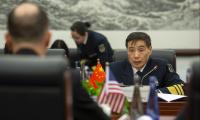Jura The idiot
General
when I began to follow China-related nonmilitary threads five years ago, they were like BRICS BRICS BRICS

"calls for China to provide compensation for the economic impact."As I said before China will smell like roses when this CV is over I guess I am not the only one think like that CV is mortal danger but it also provide China with huge opportunity to elbow you know who in the court of world opinion due to efficient and effective handling of CV and floundering effort by her ideological foe
China will emerge from the coronavirus crisis stronger than the U.S., experts warn
Published: March 25, 2020 at 9:41 a.m. ET
By
China has, so far, won the propaganda battle over which superpower can best handle a pandemic
The coronavirus pandemic gripping the globe may have its origins in China, but experts say that current trends indicate the crisis will leave it in a much stronger position geopolitically relative to the United States.
“The Chinese are in a much stronger position than they have been coming out of any recent global crisis,” Ian Bremmer, president and founder of the Eurasia Group, told MarketWatch.
“They own most of the global medical supply chain. They’ve basically contained the virus through technology-powered, authoritarian surveillance, and they’ve leveraged this success by providing aid to Europe and emerging markets,” in the fight against COVID-19.
Even as China’s economy has taken a large hit from the outbreak, and from falling global demand as it spreads throughout Europe and the United States, the country does appear to be opening for business, with the city of Wuhan — where the outbreak began in December — scheduled to lift its lockdown next week.
Carl Weinberg, founder and chief economist at High Frequency Economics, said in an interview that while it may be too early to declare the Chinese economic recovery underway, policy makers there appear to have a better handle of the situation. “The Chinese built a hospital with 2,000 beds in 10 days from start to finish,” he said. “They started building it in January before the pandemic was fully recognized. We’re way behind the curve on it.”
Meanwhile, the U.S.-China relationship has deteriorated in recent weeks, as Chinese and American leaders for the pandemic. On Tuesday, Sen. Josh Hawley of Missouri said there should be an international investigation “into the origins of the coronavirus,” and submitted legislation that calls for China to provide compensation for the economic impact.
American pride is more important than Chinese money
Our first objective is to prevent the re-emergence of a new rival, either on the territory of the former Soviet Union or elsewhere, that poses a threat on the order of that posed formerly by the Soviet Union. This is a dominant consideration underlying the new regional defense strategy and requires that we endeavor to prevent any hostile power from dominating a region whose resources would, under consolidated control, be sufficient to generate global power. - Paul Wolfowitz, US Under Secretary of Defense for Policy (1992)
